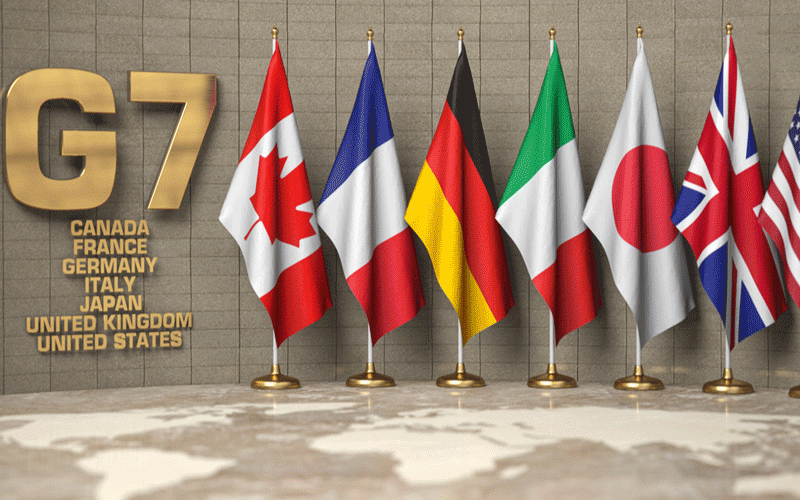
The June 2025 G7 Summit in Kananaskis, Alberta, served up a familiar chorus of grand statements on global security, economic resilience, and “sustainable development.”
But from an African perspective, particularly for those on the frontlines of climate breakdown and debt distress, the gathering once again revealed the deep chasm between rhetoric and reality.
While the G7 boasts about partnerships for the future, its failure to advance bold, binding commitments on climate finance, debt justice, and reform of the global financial architecture exposes a pattern of selective multi-lateralism that undermines Africa’s right to development.
Despite hosting leaders from the Global South including South Africa, the G7’s final communiqué was conspicuously silent on the pressing demands from African countries for a just, inclusive, and rules-based financial system.
Nowhere was this more evident than in their weak positioning on the upcoming UN Financing for Development (FfD4) conference, which they referenced merely as a future talking point, not as a platform for structural reform.
According to AFRODAD, over 50% of African countries are in or at high risk of debt distress, and yet the G7 has failed to support the creation of a UN-led multilateral debt workout mechanism — a long-standing African demand.
Debt service payments are draining public resources that should be building schools, hospitals, and climate resilient infrastructure.
But rather than supporting debt cancellation or restructuring frameworks grounded in justice and transparency, the G7 continues to push market-based instruments and private sector-driven solutions that deepen dependency and inequality.
- New perspectives: Inside new global tax reform trends
- Is public debt good or bad for Zim?
- Concerns over Zimbabwe mortgaging resources
- New perspectives: Inside new global tax reform trends
Keep Reading
While the summit endorsed “just energy transitions” and critical minerals cooperation, it neglected to address the climate finance shortfalls that continue to burden African countries disproportionately affected by extreme weather events.
The US$300 billion annual climate finance pledge, already a broken promise, was mentioned only in passing, and no progress was made on replenishing the Loss and Damage Fund or shifting public finance away from fossil fuels.
The new Canada-led Critical Minerals Production Alliance, though framed as a win-win, threatens to replicate extractive patterns that have historically disadvantaged Africa.
Without enforceable environmental, social, and governance safeguards and without meaningful African voices in governance, such initiatives risk turning mineral rich African nations into suppliers for G7 economies, not co-creators in a green transition.
The G7’s Critical Minerals agenda, framed around securing access to essential inputs for green technologies like electric vehicles and battery storage, has significant geopolitical and economic implications for developing countries in Africa.
While the strategy emphasises supply chain resilience and “trusted partnerships,” it risks replicating extractive patterns reminiscent of colonial era resource relations.
For countries such as Zimbabwe — home to some of the world's richest lithium deposits, this strategy poses a challenge to sovereign development ambitions.
Zimbabwe has recently taken bold steps to move up the value chain by banning raw lithium exports and promoting local beneficiation and processing.
These industrial policy efforts reflect a broader aspiration for economic transformation, value addition, and technology upgrading.
However, the G7's focus on securing uninterrupted access to raw materials could undermine such domestic policies by pressuring governments directly or indirectly to prioritise extraction over processing, under the guise of “strategic cooperation.”
Without meaningful co-investment in local manufacturing, technology transfer, and infrastructure development, these partnerships risk becoming a modern iteration of resource extraction colonialism. For true partnership to emerge, the G7 must align its strategy with the developmental priorities of African countries by supporting downstream processing, regional value chains, and skills development. This approach would not only enhance supply chain resilience but foster equitable and sustainable development in resource-rich countries like Zimbabwe.
In tax governance, the G7 continues to resist efforts for a truly inclusive global tax system. As Tax Justice Network Africa (TJNA) emphasises, the refusal to support the establishment of a UN Tax Convention is a stark example of how the Global North protects the interests of multinational corporations over fair taxation in developing countries.
Africa loses over US$88,6 billion annually to illicit financial flows, a crisis compounded by G7 members’ inaction.
The G7’s posture in Kananaskis also sidestepped systemic issues at the International Monetary Fund and World Bank.
As civil society voices have highlighted, African countries remain grossly underrepresented in the decision-making structures of these institutions. Governance reform is not a matter of courtesy — it is a matter of justice.
Yet, the G7’s commitments in this regard were disappointingly vague.
As the global South engages at FfD4 in Seville, African governments including Zimbabwe and civil society must move beyond appealing to Global North benevolence. The African Union and Africa Group must double down on efforts to build continental financial sovereignty through operationalising AU financial institutions, strengthening regional capital markets, and asserting African agency in global rule making.
This is especially important given calls for reparations.
Proposals for a US$1,3trillion New Climate Quantified Goal (NCQG) at COP29 was drawn down to a mere US$300 billion per year and being composed of a cocktail of financing instruments.
The problematic position of the G7 is also supported by current discussions happening within the G20 group, specifically the Sustainable Finance and Climate and Environmental Sustainability Working Groups that are supporting carbon markets and muting debt swops as potential viable solutions for financing climate resilience. This should be seen with the challenges they pose.
Ideally, carbon markets are basically a form of greenwashing and a false solution as they often allow polluters — mainly from the Global North — to continue emitting greenhouse gases under the guise of offsetting, rather than reducing emissions at the source. This undermines global climate goals and shifts the burden of climate action onto the Global South.
Moreso, these market barely benefit African countries as the carbon pricing architecture is skewed against the global South wherein nations and communities often receive minimal financial benefit. Most of the profits from carbon credit trading flow to intermediaries, project developers, or corporations in the Global North, rather than supporting local climate adaptation or resilience. For instance, carbon credits generated from African projects such as afforestation, clean cook-stoves, or renewable energy often sell for as little as US$2 to US$10 per tonne of carbon dioxide, sometimes even lower. But compliance markets in Europe (such as the EU Emissions Trading System) trade allowances at much higher prices, often above US$70 to US$90 per tonne.
Debt swops have also been on the agenda within the G20. Also known as debt for development, debt for nature, or debt for climate swaps, they are financial mechanisms in which a portion of a country’s external debt is cancelled or reduced in exchange for the government committing to invest equivalent funds in local development or environmental projects. Research shows that most debt swaps only affect a small portion of a country’s total debt stock, and therefore do not provide significant debt relief or address the root causes of debt distress.
They are also often one-off, fragmented transactions which are usually complex, with limited macro-economic impact and they risk new conditions as they often come with donor imposed conditions tied to how and where the funds are spent, which may undermine national sovereignty and development priorities.
As global economic processes are being convened, it is important to note that the Global North has chosen incrementalism over transformation. The African continent has to lead the change it needs.
Chikowore is an international development consultant with expertise in public policy and research analysis of public and private finance, climate finance, health and education financing and child rights. He currently focuses on African Union and G20 Advocacy. — [email protected]. These weekly New Perspectives articles, published in the Zimbabwe Independent, are coordinated by Lovemore Kadenge, an independent consultant, managing consultant of Zawale Consultants (Pvt) Ltd, past president of the Zimbabwe Economics Society and past president of the Chartered Governance and Accountancy Institute in Zimbabwe (CGI Zim). — [email protected] or mobile: +263 772 382 852.











